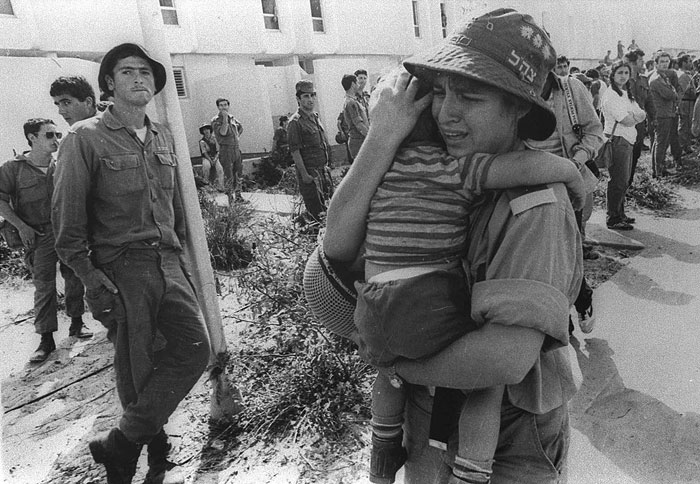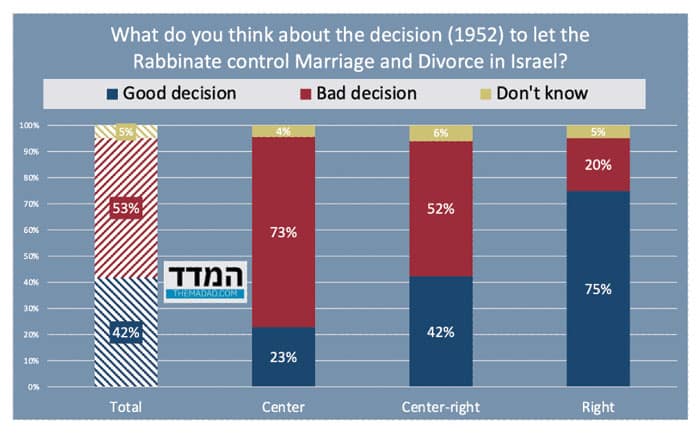 An Israeli woman soldier cries as she evacuates a Jewish settler child from an apartment building April 22, 1982 in the Sinai Desert settlement of Yamit, as part of Israel’s peace treaty with Egypt.
(Photo by Miki Tzarfati/GPO/Getty Images)
An Israeli woman soldier cries as she evacuates a Jewish settler child from an apartment building April 22, 1982 in the Sinai Desert settlement of Yamit, as part of Israel’s peace treaty with Egypt.
(Photo by Miki Tzarfati/GPO/Getty Images) Last Saturday, April 21, was exactly 41 years since the final evacuation of the city of Yamit. Golda Meir made the decision to establish the city, and after a decade Menachem Begin made the decision to evict the city. A small town, a few hundred families, on the border of the Sinai Peninsula and the Gaza Strip, by the sea. A dim, distant memory.
Yamit was the price of peace between Israel and Egypt. Israel evacuated the Sinai Peninsula, a territory that’s double the size of current Israel, that was captured from Egypt in the Six Days War. I was in the fifth grade when the debate about peace with Egypt erupted in Israel. The class split into two camps. One — the whole class, against the agreement. The second — two children, in favor of it. This was a Zionist-religious school, and the sentiment was strong and clear. No to the agreement. No to evacuation of settlements.
Time has passed. Has peace with Egypt justified Begin’s decision to give up on the territory? This might seem like an odd question, but closer examination makes it interesting. During the week of Independence, the echoes of past decisions accompany us. Israel is a young country. Its history is short. Almost everything that was done in the past is still very much present.
A lot of decisions were made in Israel. We chose 25 of those and asked the public to rank them from “excellent” to “terrible.” Of course, it is not easy to judge decisions in retrospect. Mainly because we don’t know what would have happened if other decisions had been made. Let’s say that Begin had rejected Anwar Sadat’s hand, would there have been another war? Or maybe Sadat would have gotten angry and then improved the offer.
And what if in five years peace with Egypt collapses? Of course, we hope this will not happen, and there is no reason to assume that it will, but what if it does? Would it make us change our minds about the initial decision to sign a peace agreement?
Moshe Arens, who was a member of Likud and later served as Minister of Defense and Foreign Minister, strongly opposed the agreement with Egypt. His speech in the Knesset at the time allows us to think about the questions we raised. Here is what he said: “This decision is difficult. We do not know what the results of this decision will be. Only in a few years, looking back, will we be able to say whether we made the right decision or not … Each of us can try to assess the chances, the likelihood and the probabilities … I did my assessment. In my opinion, we have gone too far with concessions. The risks we took are too great, and the stake is too great”.
Did you think this debate is over? In Israel, nothing is ever over.
So Arens assessed the risks and decided that it was too great. This was not far-fetched. The agreement certainly carried risks. And yet, for more than 40 years there has been peace between Israel and Egypt. But wait. Is 40 years enough? A majority of the Israeli public says today that the decision to sign the agreement was good (31%) or excellent (37%). But about a quarter of the public says it was not. That is, there are still quite a few Israelis who believe, even today, that peace with Egypt was not worth the cost!
Why would they have such view? We asked what people think about “the decision to sign a peace agreement with Egypt that includes the evacuation of the entire Sinai Peninsula and its settlements”. It is important to pay attention to the wording, and note that the question includes both “peace” and “evacuation”. This seems to be the key to understanding the remaining opposition to the old agreement with Egypt. The agreement that brought about peace also created a precedent of evacuation in exchange for peace. Egypt insisted on every inch, and Israel gave up every inch. Those who still believe that the decision to an agreement with Egypt are probably weighing in their position not only the peace but also the price of precedent.
The division of positions of Israelis reflect this analysis. A huge majority of left, center-left, and center voters, and also a large majority of center-right supporters – believe the decision to have peace was right. But half of the self-defined supporters of the “right” believe the decision was wrong, and this refers mostly to religious supporters of the right. Among voters of the Religious Zionist Party there is a solid majority (65%) of those who believe that the decision was bad. And remember: We are talking about the peace agreement with Egypt that was concluded more than 40 years ago.
Did you think this debate is over? In Israel, nothing is ever over.
Something I wrote in Hebrew
The State of Israel celebrates 75 with a Zionist majority. It might celebrate its 100th, God willing, with a non-Zionist majority. And this claim needs to be made a little more precise: according to the Central Bureau of Statistics’ forecast, in 40 years the ultra-Orthodox will make up a third of the country’s residents, and the Arabs about a fifth. This is a non-Zionist majority. But the forecast is not about the 100th anniversary – so why do I say 100? Here is the answer I learned from an Israeli demographer: “ … Either the forecast is incorrect, or it will happen much sooner than expected.” Why sooner? “Because if the trends continue as they are now, at some point the non-Haredi population will start to leave.”
A week’s numbers
The current view of Israeli Jews concerning another historic decision:

A reader’s response:
Avi Herman asks: “Why are you writing about Haredi exemption and say nothing about the Arabs?”
My response: This is indeed an issue that needs to be addressed. But I find it curious that only on this matter the Haredi leadership demands to be last in line. Do they also want us to solve the issue of the housing problem first for the Arabs and only then for the haredi?
Shmuel Rosner is senior political editor. For more analysis of Israeli and international politics, visit Rosner’s Domain at jewishjournal.com/rosnersdomain.























 More news and opinions than at a Shabbat dinner, right in your inbox.
More news and opinions than at a Shabbat dinner, right in your inbox.